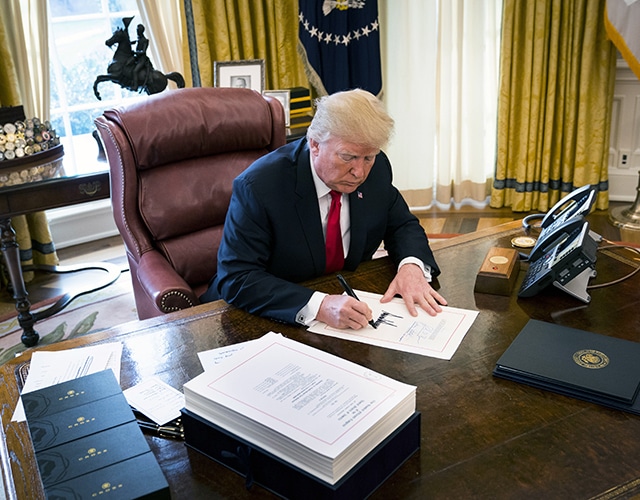The corporate tax cuts that President Donald Trump signed into law in 2017 have boosted investment in the U.S. economy and delivered a modest pay bump for workers, according to the most rigorous and detailed study yet of the law’s effects.
Those benefits are less than Republicans promised, though, and they have come at a high cost to the federal budget. The corporate tax cuts came nowhere close to paying for themselves, as conservatives insisted they would. Instead, they are adding more than $100 billion a year to America’s $34 trillion-and-growing national debt, according to the quartet of researchers from Princeton University, the University of Chicago, Harvard University and the Treasury Department.
The researchers found the cuts delivered wage gains that were “an order of magnitude below” what Trump officials predicted: about $750 per worker per year on average over the long run, compared with promises of $4,000 to $9,000 per worker.
Taxes Matter for Investment
The study is the first to use vast data from corporate tax filings to draw conclusions about the Tax Cuts and Jobs Act, which passed with only Republican support. Its findings could help shape debate on renewing parts of the law that are set to expire or have begun to phase out.
That includes a key provision targeting investment, which the authors identify as the most cost-effective corporate cut. That benefit, which allowed companies to immediately deduct investment spending from their income taxes, would be renewed as part of a bipartisan tax bill that passed the House in January.
It also challenges narratives about the bill on both sides of the aisle. Democrats have claimed the tax cuts only rewarded shareholders and did not help the economy. Republicans have called them a cost-free boon to the middle class. Both appear to have been wrong.
“The evidence that taxes matter for investment really is there,” Gabriel Chodorow-Reich, a Harvard economist and one of the paper’s authors, said in an interview. “And the evidence that corporate tax cuts are expensive also is there. They’re both just features of the data.”
Republicans set many of the individual cuts to expire at the end of next year. Whether to renew them, all or in part, will be an immediate challenge for either President Joe Biden, if he wins reelection in November, or Trump, if he is successful in returning to the White House.
c.2024 The New York Times Company. This article originally appeared in The New York Times.







